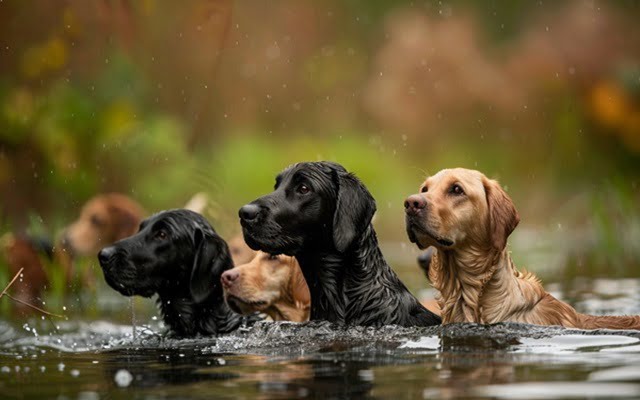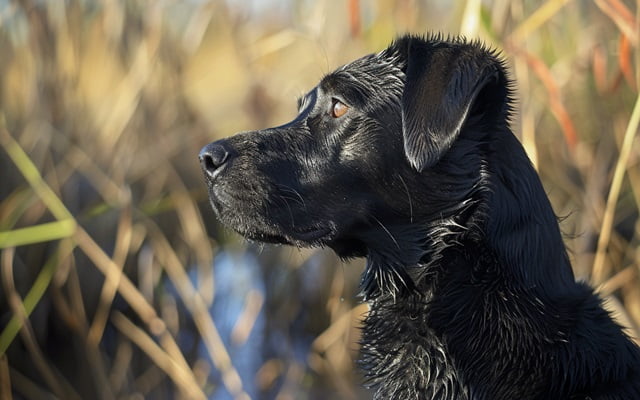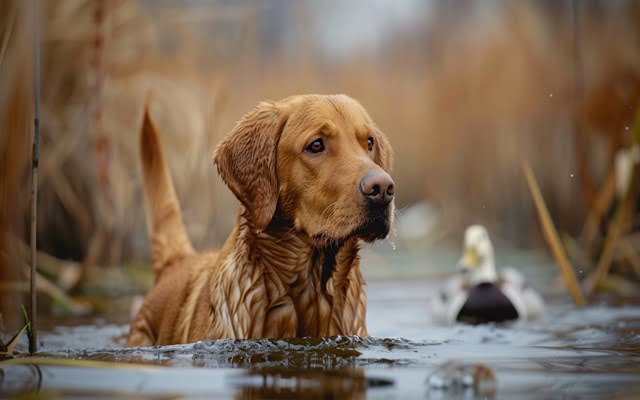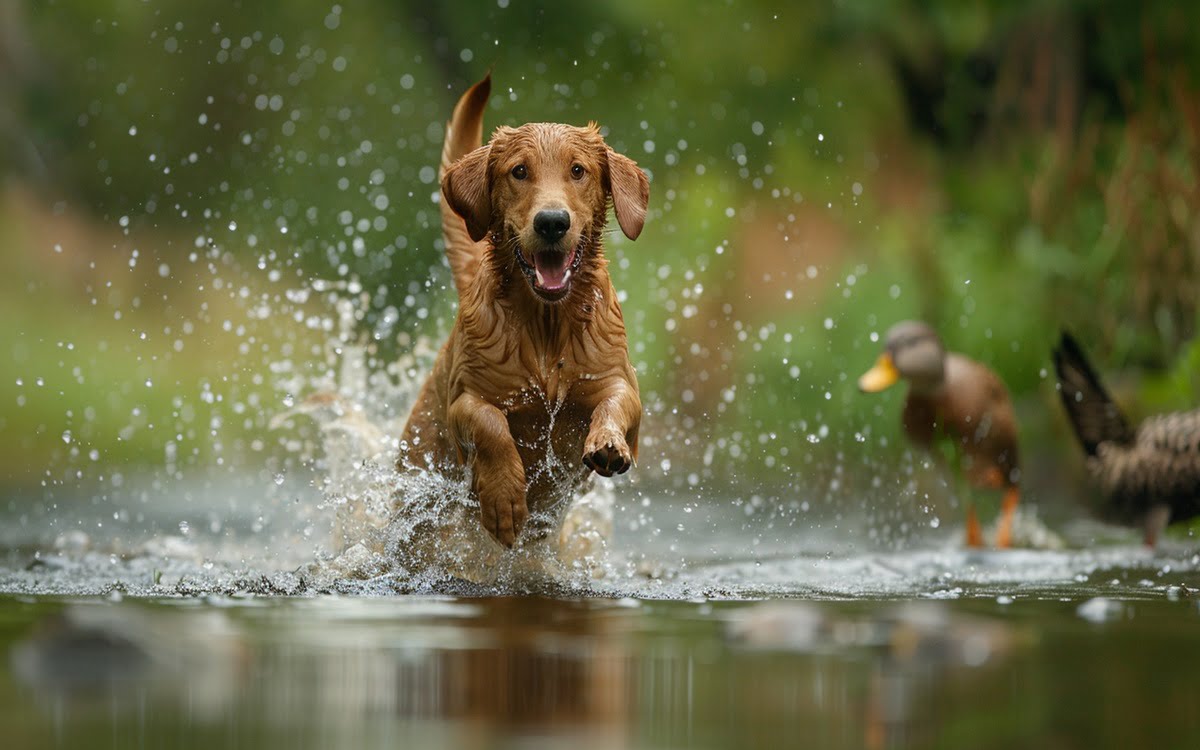Hey there, fellow waterfowlers! If you’re anything like me, the thrill of the hunt isn’t complete without a loyal, four-legged companion by your side. A well-trained duck dog isn’t just an asset – they’re the heart and soul of a successful hunt. Imagine this: a crisp fall morning, the sound of wings overhead, and your trusty retriever eagerly anticipating the splash of a downed bird. That’s the magic a duck dog brings to the marsh.
But here’s the thing: training a duck dog isn’t just about commands and drills. It’s about building a bond, understanding their instincts, and nurturing their natural abilities. It’s about those quiet moments after a successful retrieve, when your dog looks up at you with pure joy in their eyes. That’s what we’re after.
In this guide, we’re going to dive deep into the world of duck dog training. We’ll cover everything from choosing the right breed to mastering advanced techniques. We’ll even share some insider tips and tricks that I’ve picked up over years of training these incredible animals. Whether you’re a seasoned pro or a first-time duck dog owner, this guide is for you. So grab a cup of coffee, settle in, and let’s get started.
Understanding Duck Hunting Dogs: Choosing Your Feathered Friend

Before we dive into the nitty-gritty of training, let’s talk about the stars of the show: duck hunting dogs. These aren’t your average pups; they’re athletes, problem solvers, and unwavering companions. But not all duck dogs are created equal. Each breed has its own unique strengths and weaknesses, and choosing the right one for your hunting style is crucial.
These are just a few of the many breeds that excel at duck hunting. It’s important to research different breeds and talk to experienced hunters to find the one that best fits your needs and lifestyle.
Temperament and Personality
Beyond breed, individual temperament is key. Look for a dog with a strong prey drive, a love of water, and a willingness to learn. A good duck dog should be eager to please, but also independent enough to work on their own. They should be able to handle distractions and stay focused on the task at hand.
Don’t forget, training a duck dog is a long-term commitment. Choose a dog that you’re willing to invest time and energy in. The rewards of a well-trained duck dog are immeasurable, but it takes dedication and patience to get there.
Basic Obedience Training: Building a Solid Foundation

Alright, you’ve got your eager pup by your side, ready to embark on their duck dog journey. Before we hit the marshes, we need to lay the groundwork with rock-solid obedience training. Think of this as teaching your dog the alphabet before they can write a novel. It’s the foundation upon which all other training will be built.
The ABCs of Obedience
- Sit: This is the simplest command and a great place to start. Hold a treat in front of your dog’s nose, lift it up and back slightly, and say “Sit.” As their bottom hits the ground, reward them with the treat and praise.
- Stay: Once your dog has mastered “Sit,” introduce “Stay.” Have them sit, then hold your hand up in a “stop” gesture and say “Stay.” Start with short durations and gradually increase them.
- Come: This command is crucial for safety and control in the field. Start by calling your dog’s name followed by “Come” while backing away. When they reach you, reward them with a treat and praise.
- Heel: This command teaches your dog to walk politely by your side. Hold a treat in your hand at your side, and say “Heel” as you start walking. Keep the treat at your side and reward your dog for staying close.
- Fetch: This is a natural instinct for most dogs, but it’s important to teach them to fetch on command. Throw a toy or dummy a short distance and say “Fetch.” When they bring it back, reward them with praise and a treat.
Tips for Successful Obedience Training
- Positive Reinforcement: Focus on rewarding good behavior rather than punishing bad behavior. This will make training more enjoyable for both you and your dog.
- Consistency: Use the same commands and techniques every time you train. This will help your dog learn faster and remember what you’ve taught them.
- Patience: Don’t get discouraged if your dog doesn’t learn everything right away. Some dogs learn faster than others.
- Short Sessions: Keep training sessions short and frequent, especially when starting. This will help your dog stay focused and engaged.
- Fun: Make training fun for both you and your dog. Use games, toys, and treats to keep them motivated.
Remember, obedience training is an ongoing process. Even after your dog has mastered the basics, continue to practice regularly to reinforce their skills. A well-behaved dog is a joy to have in the field and at home.
Water Training: Making a Splash with Confidence

Duck hunting and water go together like, well, ducks and water! So, it’s no surprise that water training is a cornerstone of preparing your retriever for the marsh. This is where your pup’s natural instincts truly shine, but even the most enthusiastic swimmers need guidance to become effective retrievers.
Introducing Your Dog to Water
Not every dog takes to water like a, well, duck. Some need a gentle introduction. Start by choosing a calm, shallow body of water like a pond or a lake with a gentle slope. Let your dog explore at their own pace, offering encouragement and praise. You can even wade in with them, making it a fun game.
Teaching Your Dog to Swim
If your dog natural swimmer, don’t worry! With patience and positive reinforcement, most dogs can learn. Use a floating toy or bumper to entice them into deeper water. You can also use a life jacket for extra support and confidence.
Remember, never force your dog into the water. Let them explore at their own pace and make it a positive experience.
Retrieving from Water
Once your dog is comfortable swimming, it’s time to introduce retrieves. Start with short retrieves in shallow water, using a floating dummy or bumper. As they gain confidence, gradually increase the distance and depth of the retrieves.
Advanced Water Skills
Once your dog has mastered the basics, you can start working on more advanced water skills:
- Blind Retrieves: This involves sending your dog to retrieve a bird they didn’t see fall. It requires good communication and trust between you and your dog.
- Multiple Retrieves: Teach your dog to retrieve multiple birds in a single outing. This requires good marking skills and stamina.
- Breaking Ice: If you hunt in cold climates, you may need to teach your dog to break ice to retrieve birds. This requires special training and precautions to ensure their safety.
Tips for Successful Water Training
- Start Early: The earlier you start water training, the more comfortable your dog will be in the water.
- Make it Fun: Use games and toys to make water training enjoyable for your dog.
- Be Patient: Don’t rush the process. Let your dog progress at their own pace.
- Positive Reinforcement: Reward your dog for good behavior with praise, treats, or petting.
- Safety First: Always supervise your dog in the water and be aware of potential hazards, such as strong currents or underwater obstacles.
With patience, consistency, and positive reinforcement, your duck dog will be a confident and capable retriever in no time. Now, let’s move on to the heart of duck dog training: retrieving!
Retrieving Training: The Art of the Fetch
Retrieving is the bread and butter of duck dog training. It’s what they’re bred for, what they dream about, and what makes them invaluable partners in the field. This section is all about honing your dog’s natural instincts and teaching them the nuances of a perfect retrieve.
The Basics of Retrieving
Before we tackle advanced techniques, let’s nail down the fundamentals:
- Hold: Teach your dog to hold an object gently in their mouth without chewing or dropping it. Start with a soft dummy or toy, and reward them for holding it still.
- Fetch: This builds on the “Hold” command. Throw the dummy or toy a short distance and encourage your dog to fetch it. When they bring it back, have them “Hold” before rewarding them.
- Delivery to Hand: This is crucial for a successful hunt. Train your dog to bring the retrieved object directly to your hand and release it on command.
Types of Retrieves
Duck hunting requires a variety of retrieves, each with its own challenges:
- Single Retrieves: The most basic retrieve, involving one bird. This is where you’ll start, gradually increasing the distance and complexity of the retrieves.
- Multiple Retrieves: This involves retrieving multiple birds in a single outing. It requires good marking skills and stamina.
- Blind Retrieves: This is the ultimate test of a duck dog’s skills. It involves sending your dog to retrieve a bird they didn’t see fall, based on your direction.
Tools of the Trade
To make retrieving training fun and effective, you’ll need a few tools:
- Training Dummies: These simulate the weight and feel of a real bird, helping your dog get used to carrying objects in their mouth.
- Bumper Boys: These launching devices can throw dummies or bumpers long distances, simulating real hunting scenarios.
- Whistles: A whistle is a valuable tool for communicating with your dog in the field, especially for blind retrieves.
Tips for Successful Retrieving Training
- Start Simple: Begin with short, easy retrieves and gradually increase the difficulty as your dog progresses.
- Positive Reinforcement: Reward your dog for good retrieves with praise, treats, or petting.
- Vary the Terrain: Train your dog to retrieve in different terrains, such as tall grass, water, and wooded areas.
- Proofing: Introduce distractions, such as other dogs or birds, to ensure your dog stays focused on the retrieve.
- Have Fun: Retrieving should be a fun game for your dog. Keep training sessions upbeat and positive.
Advanced Training: Polishing Your Duck Dog’s Skills
Congratulations! You and your pup have mastered the fundamentals of obedience, water work, and retrieving. But the journey doesn’t end there. Just like a seasoned athlete refining their technique, advanced training takes your duck dog’s abilities to the next level. It’s about honing their instincts, sharpening their focus, and preparing them for any challenge the marsh throws their way.
Mastering the Marked Retrieve
A marked retrieve is when your dog sees the bird fall. While it may seem straightforward, there are nuances to perfect:
- The Line: Teach your dog to run a straight line to the downed bird, minimizing wasted time and energy.
- The Pickup: Encourage a gentle but firm grip on the bird to prevent damage.
- The Delivery: Train your dog to deliver the bird to your hand promptly and without hesitation.
Tackling the Blind Retrieve
Blind retrieves are the pinnacle of duck dog training. It’s where your communication and trust with your dog are truly tested. Here’s how to break it down:
- The Setup: Plant a hidden bumper or bird in a specific location.
- The Whistle: Use a series of whistle blasts to guide your dog in the general direction of the hidden object.
- Hand Signals: Once your dog is in the vicinity, use hand signals to direct them to the exact spot.
- The Reward: When your dog successfully retrieves the object, celebrate with enthusiastic praise and a treat.
Overcoming Distractions
Duck hunting isn’t always a quiet affair. Gunshots, other dogs, and even tempting critters can distract your pup. To keep them focused:
- Start Small: Begin training in a controlled environment with minimal distractions.
- Gradually Increase: As your dog gets better, introduce more challenging distractions, such as other dogs playing nearby.
- Use a Check Cord: A long leash gives you control while allowing your dog to work at a distance.
- Positive Reinforcement: Reward your dog for staying focused despite distractions.
Handling on Land and Water
A well-trained duck dog should be proficient both on land and in the water. Practice handling drills in both environments, using a combination of whistle blasts and hand signals. This will ensure your dog is responsive and obedient wherever the hunt takes you.
Conditioning and Endurance
Duck hunting can be physically demanding for both you and your dog. Make sure your pup is in top shape with regular exercise and a balanced diet. Swimming, running, and playing fetch are great ways to build their stamina and endurance.
Additional Tips and Resources: Your Duck Dog Training Toolkit
Duck dog training isn’t just about commands and drills; it’s a journey of building a bond, understanding your dog’s instincts, and nurturing their natural abilities. To help you along the way, we’ve gathered a few extra nuggets of wisdom and resources that will make your training adventure even more rewarding.
Insider Tips for Training Success
- Start Early: The saying “you can’t teach an old dog new tricks” holds some truth. While it’s never too late to train a dog, starting early gives you a head start in shaping their behavior and establishing good habits.
- Keep it Positive: Duck dog training should be a positive experience for both you and your dog. Use praise, treats, and toys to reward good behavior, and avoid harsh corrections or punishment.
- Be Consistent: Use the same commands and techniques every time you train. Consistency helps your dog learn faster and remember what you’ve taught them.
- Practice Makes Perfect: Don’t expect overnight results. Duck dog training takes time, patience, and consistent practice. Set aside regular training sessions, even if it’s just for a few minutes each day.
- Seek Professional Help: If you’re struggling with certain aspects of training or your dog is exhibiting behavioral issues, don’t hesitate to seek professional help from a qualified dog trainer.
Gear Up for Success
Having the right gear can make a world of difference in your duck dog training:
- Training Dummies: These simulate the weight and feel of a real duck, helping your dog get used to carrying objects in their mouth.
- Bumper Boys: These launching devices can throw dummies or bumpers long distances, simulating real hunting scenarios.
- Whistles: A whistle is a valuable tool for communicating with your dog in the field, especially for blind retrieves.
- E-Collars: Electronic collars, when used responsibly, can be effective training tools for reinforcing commands and correcting unwanted behaviors at a distance.
- First Aid Kit: Always be prepared for minor injuries in the field. A basic first aid kit should include bandages, antiseptic, tweezers, and a muzzle (just in case).
Resources for Further Learning
The internet is a treasure trove of information on duck dog training. Here are a few reputable resources to get you started:
- The Duck Dog Trainer: This website offers a wealth of information on all aspects of duck dog training, from basic obedience to advanced techniques.
- The Retriever Journal: This magazine is dedicated to retriever training and features articles from top trainers and experts.
- YouTube Channels: Many experienced trainers share their knowledge and expertise through YouTube videos. Search for channels like “The Duck Dog Trainer,” “The Retriever Journal,” and “Gun Dog TV.”
- Training Clubs and Organizations: Joining a local training club or organization can provide valuable support, resources, and opportunities to connect with other duck dog enthusiasts.
Conclusion: The Journey Continues
Training a duck dog is an ongoing process, a journey filled with challenges, triumphs, and unforgettable moments. It’s about building a bond with your canine companion that goes beyond the hunt. It’s about witnessing their natural instincts flourish and their confidence soar. And it’s about those magical moments in the marsh when everything comes together, and you and your dog become a seamless team.
So, embrace the journey. Celebrate the small victories, learn from the setbacks, and never stop exploring new training techniques and challenges. Your duck dog is capable of amazing things, and with your guidance and support, they’ll become the ultimate hunting partner you’ve always dreamed of.
FAQ
What are some common mistakes to avoid during duck dog training?
Ah, the pitfalls of duck dog training! I’ve seen ’em all, folks. One biggie is rushing the process. Remember, Rome wasn’t built in a day, and neither is a champion retriever. Be patient, let your pup learn at their own pace. Another common mistake is inconsistent training. You gotta be like a broken record—same commands, same expectations, every time. And for the love of ducks, don’t skimp on the praise! Positive reinforcement goes a long way with these eager learners.
Can older dogs be trained for duck hunting, or is it best to start with a puppy?
Good news, folks! You can absolutely teach an old dog new tricks, especially when it comes to the thrill of the hunt. While puppies are like sponges, soaking up knowledge, older dogs often have a maturity and focus that can be an advantage. Just be patient, break things down into smaller steps, and celebrate those “a-ha!” moments. Remember, it’s never too late to create a bond with your dog and share the joy of duck hunting.
How do I introduce gunfire to my duck dog without scaring them?
This is a big one, folks! Gunfire can be downright terrifying for a dog who’s not used to it. Start slow and steady. Begin with cap guns or starter pistols at a distance, gradually increasing the volume and proximity as your dog gets comfortable. Pair the sound with positive reinforcement, like treats and praise, so they associate the bang with good things. If your dog shows signs of fear, back up a step and go at their pace.
My duck dog is great at retrieving on land, but struggles in the water. What can I do?
Ah, the landlubber retriever! Don’t worry, it’s not uncommon. Some dogs need a little extra coaxing to embrace the water. Start with shallow, calm water and make it fun! Use floating toys, play fetch, and gradually venture into deeper areas. If your dog is hesitant, a life vest can provide both safety and confidence. Remember, patience is key. Don’t rush the process, and celebrate every little victory.
Are there any specific health concerns I should be aware of when training a duck dog?
You betcha! Duck hunting takes a toll on a dog’s body. Ear infections, hypothermia, and paw injuries are common concerns. Keep an eye on those ears after swims, invest in a good dog vest for cold weather hunts, and check those paws regularly for cuts and scrapes. A tired dog is a happy dog, but make sure they’re not overexerting themselves.

My job is to make sure every fact is right and every article is a joy to read. I’m kind of like a dog trainer for information – I make it behave!

